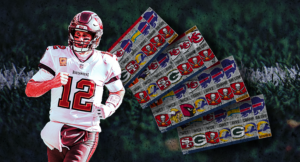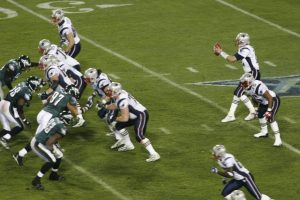Welcome to Four Down Territory! This is a space where I’ll write about four things in professional sports every Saturday. Whether it’s the four greatest moments or the four worst blunders or anything in between, the only rule is that I’ll discuss four things. In my tenth installment, I’ll be outlining some of the best quarterbacks to play before the NFL-AFL merger in 1970.
This is an era of big data, analytics, and explosive passing in the NFL. The rules disproportionately favor wide receivers, and true shutdown corners are harder and harder to come by. Thursday’s Hall of Fame game gave me a blast from the past. I want to showcase some of the game’s greatest quarterbacks before 1970, because these guys tend to fall by the wayside when we think of the greatest QBs ever. Their statistics simply can’t match the modern players because the game was different back then. Today, we use the term “game manager” derisively, but that’s what a quarterback should do: manage the game. These QBs were the best at it, thanks to their knowledge of the game and consistent performance. Hope you enjoy!
Slingin’ Sammy Baugh
Slingin’ Sammy was destined for greatness as the sixth overall selection from TCU to the Washington Redskins. Yet, we had no idea of his impact on the very game as we know it. Baugh played during the Great Depression and World War II. These were very lean years for the NFL, as World War II pressed many of the players into military service. During the war, there just wasn’t much interest in the seemingly insignificant games and teams had to merge or fold to field full games. Sammy Baugh was able to rise above these adverse conditions and become one of the greatest quarterbacks ever. His trick was the forward pass, a routine play today but highly uncommon back then. Baugh was more accurate than any quarterback before him, making the forward pass a viable option that Washington used regularly. Passing wasn’t his only strength, as he was one of the most versatile players ever. He played quarterback, cornerback, and punter, filling important needs in a league starved for players. In 1943, he had his finest season as a pro: he led the league in passing, punting (45.9 yard average), and interceptions (11). When all was said and done, Baugh set 13 NFL records over three positions, won six passing titles and two championships, and made Washington the football town it is today. Oh, and every team utilized the forward pass after him.
Otto Graham
We talk about winning as an important individual statistic, even though it’s done as a team. How many times have you heard someone compare players by the number of championships won? We all know that this is what defines legacies, but Otto Graham is still overlooked. Graham won seven championships and appeared in the NFL or AAFC Championship game ten times. He played for the Browns that long ago. Yes, they were actually elite back then. They started play in the All-America Football Conference (AAFC), winning four of the league’s eight championships in total. Following the 1949 season, the AAFC merged into the NFL, but this did not change the disrespect that NFL owners had for the AAFC teams. Commissioner Bert Bell scheduled the Browns to play the two-time defending champion Philadelphia Eagles (boy, this really was a long time ago), figuring it would be a smackdown. But, Otto Graham led coach Paul Brown’s innovative offensive, taking advantage of advanced passing concepts and motion shifts to beat Philadelphia through the air. He threw for 346 yards and 3 touchdowns, a great line no matter the era. 14 weeks later, Graham led the Browns to their first NFL championship, passing for four touchdowns to beat the Los Angeles Rams. When all was said and done, Graham was the greatest winner this game has ever seen, and we ought to hear his name more when we discuss winning at any level of football.
Bart Starr
Pretty much every time New England plays, we have to hear about how Tom Brady was a sixth round draft choice and the 199th overall pick. But when we’re thinking about draft steals, our view is too narrow, and Bart Starr rarely comes up. Guy was picked in the 17th round, 200th overall, and again, all he did was win. Starr compiled a 9-1 record in the postseason and a 104.8 passer rating, still the highest mark in league history. His only loss was his first playoff game, the 1960 NFL Championship that they dropped to Philadelphia by three points. Perhaps more importantly, Starr was the engine that made Lombardi’s machine go. He acted as a coach on the field and called his own plays, executing Lombardi’s game plans to a T. Starr and the Packers employed a very balanced offensive attack, placing particular emphasis on the sweep to showcase the mobility of their offensive line. Though Starr never attempted more than 300 passes in any season, his passes were almost always effective. When we think of Starr, though, one shining moment stands out from his five championships. In his and Lombardi’s last hurrah, Green Bay trailed Dallas by three in the 1967 NFL Championship Game, better known as the Ice Bowl. The last drive was vintage Packers football: six passes, six runs, and a -50 degree wind chill. Starr calmly drove Green Bay down the field and his last run on the drive was most memorable. Without telling any of his teammates (but of course consulting with Lombardi), Starr ran a quarterback sneak, using a double-team from center Ken Bowman and guard Jerry Kramer to score the winning touchdown. Had Starr made the wrong call, time would’ve run out and Green Bay’s three-peat would’ve been foiled. He is still the only QB to win three championships in a row. When all was said and done, Starr was a winner who cared most about the team, and who was the best field general for Vince Lombardi.
Johnny Unitas
This is the QB who transcended era, a player so great that he still gets mentioned as one of the greatest quarterbacks ever. It’s hard to believe he was cut by Pittsburgh and was paid $6 a game playing semi-pro ball for the Bloomfield Rams. But in a very representative story in sports, John Constantine Unitas made the most of a lucky break. After signing with the Baltimore Colts, he was thrust into the starter’s role after George Shaw went down with an injury. He proceeded to throw an interception returned for a touchdown, but he persevered. In 1957, Unitas led the league in passing (2,550 yards) and touchdowns (24), but the next year he would achieve greater heights. We all know of The Greatest Game Ever Played, but it was only made that way because of Johnny Unitas. In the 1958 NFL Championship Game, Unitas and the Colts found themselves down by three with two minutes remaining in regulation. Undeterred, Unitas introduced the league’s newest innovation in front of a national audience: the two-minute drill. Calling his own plays, Unitas calmly and swiftly led the Colts down the field for the tying field goal. He didn’t call a run the entire drive, instead throwing the ball and finding Hall of Fame receiver Raymond Berry time and again. In overtime, Unitas had the opportunity to lead a drive to win the game this time, and he mixed the pass and the run to punch it in the end zone and secure the title for the Colts. The game was a master class in timing and execution, the two elements of offensive playcalling that are still used today. Unitas and Berry also showed the world the importance of rhythm between quarterback and receiver, as Berry recorded 12 receptions for 178 yards and a touchdown. This game lifted the NFL to the popularity it enjoys today, thanks to Unitas’ clutch performance for the dramatic victory. Over the rest of his impressive career, Unitas amassed three MVP awards, three championships, an innumerable amount of records, and the distinct title of the best quarterback ever. When all was said and done, Unitas was a hard worker who perfected his craft, revolutionized football, and made it the game it is today.





